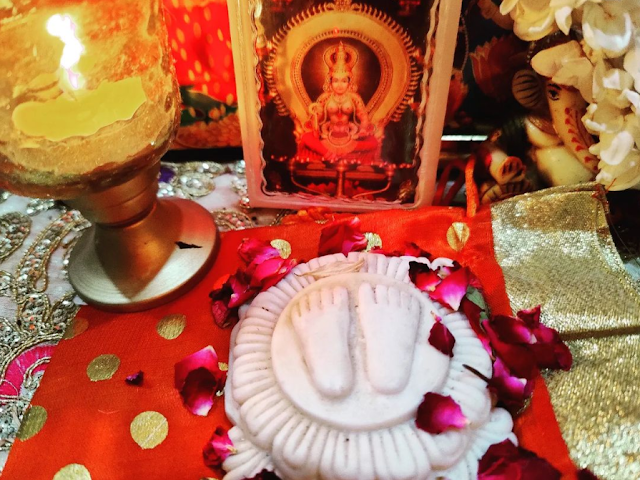Bhadrakali worship and its benefits: Having grown up in Kerala, Bhadra Kali worship has always been a part of my childhood. The ringing of temple bells and the scent of jasmine flowers are memories I hold close. As a third generation devotee of Goddess Bhadra Kali, the traditions related to the worship of the Divine Mother are an integral part of my daily sadhana. [READ: Sri Venkateswara Temple in Sydney]
Why is Bhadrakali worshipped?
In Kerala, Bhadrakali is worshipped as the daughter of Lord Shiva, with her origin being traced to the third eye of Lord Mahadev. Bhadrakali worship is mostly prevalent among Hindu famillies that follow the matriarchal system.
My grandfather is known to have been such an ardent devotee of 'Azhakiyakavu Bhagawathy' that his Bhakti is believed to have paved the way for his final merging with his Ishta Devata's form. I grew up hearing so many stories about how Bhakti wins the instant grace of Bhadrakali.
[READ: Gayatri Mantra - Why Chant It]
Is Bhadrakali powerful?
In the grand scheme of life, how vital and powerful is the mother of a home? The goddess, or the Divine Mother Adi Parashakti, is most powerful, in a way that our words and our imagination cannot begin to fathom.
Great Jnanis such as Sri Adi Shankaracharya and Sri Ramakrishna Paramahansa were blessed to have earned the grace of Bhadrakali, which reflects in their sadhana and their compositions.
A wonderful way to connect to their sadhana is by listening and learning the compositions of Sri Adi Shankaracharya, particularly the 'Kanakadhara Stotram' and 'Saundarya Lahari', which are synonmous with abundant wealth and instant grace of the Divine Mother.
What are the benefits of worshipping Bhadrakali?
Rather than thinking about the benefits of worshipping Bhadrakali, consider the peace, the joy and the sense of divine ocean-like protective love. What are the benefits of loving your mother? In the same way, Bhadrakali's all-pervading love is an enthralling experience that can encompass you.
The divine protection of Goddess Bhadrakali is an electrifying experience in itself as she watches over all with the ferocious, protective love of a mother. [READ: Gayatri Mantra as Panchamukhi]
Remember to contemplate on the Divine Mother in her most beautiful, effulgent form with gratitude and humility.
In front of the mother, what matters is your emotion, your love and connection.
Offering red hibiscus flowers or jasmine garlands on Tuesdays and Fridays is believed to please the Divine Mother. You can also make an offering of 'kadumpayasam' on special occasions to keep as prasad before Bhadrakali.
Remember, the divine mother is always awake when her children call upon her. Her grace is instant, just as a mother's response is to her child.
[READ: Can ladies chant Gayatri mantra]
Close your eyes or focus your eyes on the form of the beautiful Goddess and be her child, calling out to her with playful abandon.
Read these posts to strengthen your sadhana:

Comments